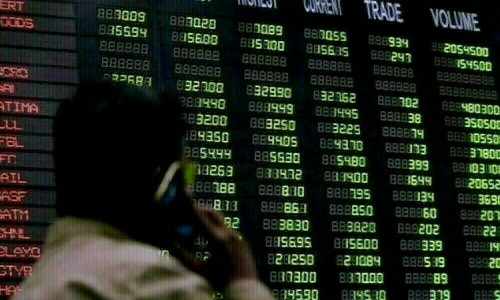PSX Experiences Downturn: KSE-100 Index Drops Over 700 Points
The Pakistan Stock Exchange (PSX) encountered a wave of negative investor sentiment, evidenced by the KSE-100 Index plummeting by over 700 points during Monday’s trading session.
As of 12pm, the benchmark index stood at 118,393.53, marking a significant decline of 709.14 points, which translates to a 0.6% decrease.
The downturn was largely attributed to increased selling activity observed in pivotal sectors such as automobile manufacturing, oil and gas exploration, oil marketing companies (OMCs), and power generation. Major stocks including HUBCO, OGDC, PPL, POL, MARI, PSO, and SSGC all reflected this negative trend by trading in the red.
The preceding week saw the PSX facing consistent headwinds. Investors displayed a cautious approach in anticipation of the forthcoming federal budget. Mounting anxieties over potential tax measures contributed to a sustained downward trajectory in the market.
Specifically, the KSE-100 Index contracted by 546.47 points, equivalent to a 0.45% week-on-week (WoW) decrease, settling at 119,102.67 points compared to the previous week’s close of 119,649.14 points.
Global Market Overview
Across the globe, Asian stock markets generally showed positive movement on Monday. The euro also experienced a surge following President Donald Trump’s decision to postpone the imposition of 50% tariffs on goods from the European Union. This extension offers a temporary respite amidst his frequently shifting trade strategies.
On Sunday, President Trump deferred the deadline for trade negotiations to July 9, extending it from the initial June 1 date announced on Friday. This decision came after European Commission President Ursula von der Leyen emphasized the need for additional time to secure a satisfactory agreement.
Market confidence had been stabilizing after a notable selloff across various asset classes the previous month. Trump’s pause on implementing growth-inhibiting tariffs, coupled with investor eagerness for new trade agreements—following a pact with the UK and an interim arrangement with China—contributed to this stabilization.
However, the latest policy adjustments by the U.S. administration serve as a reminder of the potential for rapid changes in circumstances. Analysts have noted a trend of investors reallocating capital from the U.S. towards Europe and Asia, factoring in the possibility of a U.S. recession and subsequent global economic deceleration.
Apple also found itself embroiled in trade tensions when President Trump proposed a 25% tariff on all imported iPhones purchased by U.S. consumers.
On Monday, MSCI’s broadest index of Asia-Pacific shares, excluding Japan, saw a modest increase of 0.12%, while Japan’s Nikkei index showed a marginal gain.



Comments (0)
No comments yet. Be the first to comment!
Leave a Comment